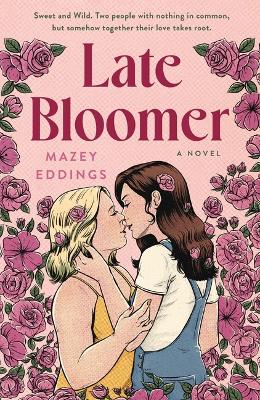
The Romantic Comedy Book Club
Having read three of Mazey Eddings's books, she has quickly become one of my favorite authors. The care she takes to not only address but also educate her readers is praiseworthy. "Late Bloomer" is no exception, as she takes on neurodiversity once more, tackling the topics of autism, ADHD, expectations, and adaptability. I will warn that those who have enjoyed Mazey's previous books may be in for a surprise with this one, as it adopts a more introspective approach rather than focusing on external interactions between characters. While the humor may take a backseat in this wonderful tale, the heart and talent of Mazey still shine through, weaving a beautiful story of how true opposites can find their way to one another, no matter what obstacles are in their way.
How do you survive in a world where you put everyone and everything before yourself? Just ask Opal, as that has been her method of survival for as long as she can remember. A giver, people-pleaser, and loyal to a fault, Opal just wants to make everyone around her feel loved and special, even if it leaves her feeling drained and empty. Is it too much to want just one person in this lonely world to care for her as much as she cares for others? Apparently not when you win the lottery! With people emerging from the woodwork for her attention, including the supposed best friend who feels owed for buying her the lottery ticket (despite the fact that she is sleeping with Opal's ex-boyfriend, who "conveniently" remembers she exists and misses her terribly), Opal needs to escape the newfound chaos that is her life. After falling into a late-night rabbit hole and impulsively acting on a Facebook Marketplace advertisement, Opal finds herself in Asheville, staring at her new home—a beautiful flower farm beyond her wildest dreams. Unfortunately, someone is staring back at her, and they are not happy.
Pepper has enough ongoing in her life; the last thing she needs is a stranger showing up at her front door, claiming to be the new owner of Thorns and Bloom, her home, her happiness, her only safe haven with her late Grandma Lou. Why hadn't Lou left a will? Instead, her con-artist mother has literally sold the farm from right under her, and she will do anything to get it back. First, she needs to get rid of the pink-haired pixie who just showed up. Easier said than done, as her Bambi-like qualities make it impossible not to want to protect her. Energized by fear (with a touch of lust), Pepper is determined to return her farm to its rightful owner, even if it means coming up with some type of payment deal to buy it back. As luck would have it, a local contest may be the answer to her prayers, but to make her dreams come true, she has to strike a deal with her worst nightmare.
Mazey attentively addresses the topic of labels with the due diligence she always exhibits in her writing. She uses Pepper and Opal as opposing views on the impact labels have on our psyche. For Opal, the definition of a label is more restrictive than freeing. Whether it's her label as an artist or as a neurodiverse individual, she finds the rigidity of labels constricting and suffocating. The only label she proudly embraces is being bisexual, illustrated by the bi flag on her vehicle. Pepper, on the other hand, identifies as autistic and struggles to find the correct label for her sexuality—is she bisexual, pansexual, demisexual? For her, labels help her neurodiverse brain stay in the "correct lane," as each label comes with its own set of rules, expectations, and guidance. For Pepper, the absence of a label is synonymous with chaos. For Opal, the absence of a label signifies the freedom to explore all possibilities. Unfortunately, Opal also views it as an inability to commit or to identify, and therefore as yet another method of being rejected by society.
Mazey blends sensuality, intimacy, heat, and emotion in each interaction between Pepper and Opal. It wasn't just written to add spice to the book; it represented how these two characters could express themselves, drop the labels, and just be present with one another.
A noticeable difference in this book that may be off-putting to seasoned Mazey readers is the extensive time spent inside the characters' heads. Typically, there is a balance between primary character interaction, secondary character interaction, and the world around them. This time, we delve deeper into the inner thoughts and perceptions of the characters. While this introspective approach is insightful for understanding the characters, it causes the story to progress slowly, creating an isolating effect between the characters. For the first half of the book, instead of a constantly intertwining story, it alternates between Opal, then Pepper, and then, if we're lucky, an engagement between both of them. This creates a disconnect of anticipation for the overall story, making it easy to engage with or disengage from rather than being fully absorbed by it.
"Late Bloomer" is a beautifully woven tale that showcases the use of inner strength to face the outer world. Yes, this book spends more time than usual in the minds of its characters, but it adds so much depth to each interaction that I couldn't imagine it being written any other way. While it may not be for everyone, I thoroughly enjoyed it and can't wait to see what else Mazey has in store for the future.
